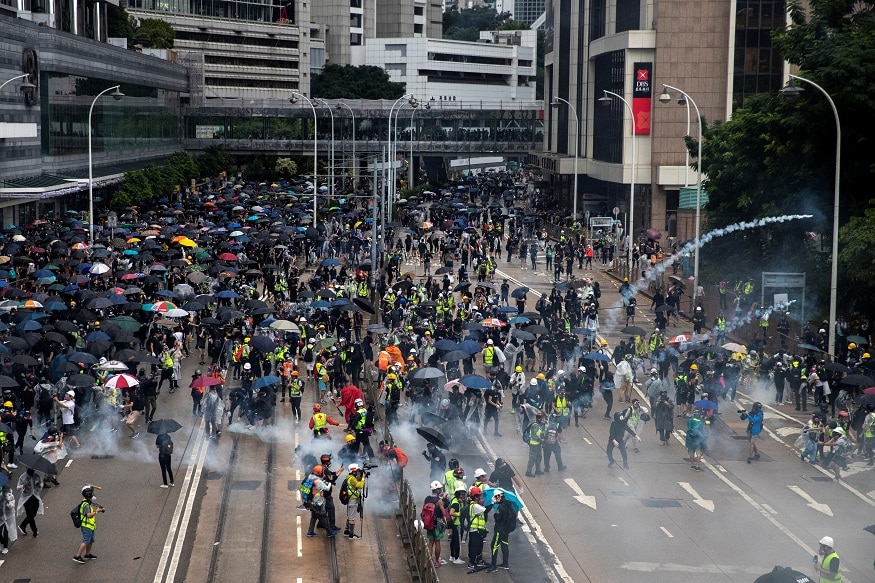- China broke the promises they made to Hong Kong
- The mask ban put in place across the city last month was madness
Hong Kong's last British governor, Chris Patten, has hit back at his Beijing critics who accuse him of trying to "devastate the city" in the wake of months-long pro-democracy protests.
China's Ministry of Foreign Affairs accused Lord Patten, the current chancellor of Oxford University, of "hypocrisy, bigotry and ruthlessness" after he suggested the mask ban put in place across the city last month was "madness".
They said Lord Patten, who served as the governor of Hong Kong from 1992 until Britain's handover of the city to China in 1997, was using a "black hand" to meddle in Hong Kong's affairs.
In a wide-ranging interview with the ABC's The World program, Lord Patten said the accusations were "so preposterous that nobody of any intelligence should give it any credence".
He also criticised other "absurd arguments" made in China's state media about Hong Kong's history and the current unrest, including allegations the Chinese Communist Party gave the city democracy, and claims that foreign powers have helped organise the protests.
Here's some of what Lord Patten had to say:
On the claim that 'Britain never gave Hong Kong democracy':
"When Britain talked about introducing greater democracy in Hong Kong, who was the biggest critic?
Who said this mustn't happen? The Chinese Communist Party.
Because they said to Britain: 'You mustn't do that, because if people get democracy like in Singapore or Malaysia or other British colonies, they'll think they're going to have independence, and that's not going to happen'.
One of the most absurd arguments is the suggestion that China was in favour of democracy — China's never been in favour of democracy …
The old bit of propaganda, that 'Well, you didn't do it all before 1997, so you mustn't criticise us afterwards' — how many years is it since 1997?
22?
What are the Chinese Government doing?
What have they done, which has actually produced a generation of people who want to be independent of China?"
On state media claims that he is a 'black hand':
"It's simply propaganda …
If you want to know what's happening in Hong Kong, if you're a Westerner, you look at the Hong Kong Free Press website — I hope in saying that I'm not going to bring about its closure.
The idea that kids, who were born in many cases way after I left Hong Kong, are being manipulated by a 75-year-old former diplomat is so preposterous that nobody of any intelligence should give it any credence, let alone write it …
I'm not criticising the Chinese for not implementing democracy, what I'm criticising them for is the squeeze they've put on freedoms right across the board in Hong Kong.
They broke the promises they made in developing democracy in Hong Kong.
And you can't argue against that, because it's clear, it's on the record.
And I think that was a terrible error.
On claims the CIA is organising protests in Hong Kong:
"Well, I wonder how much a totalitarian regime understands what's happening down below, among the people.
The Chinese Foreign Minister is a highly "intelligent" man, and only a week or so ago [he] was saying the demonstrations were all a result of things being whipped up by the CIA or the British Government — the British Government couldn't manage a traffic jam in London, let alone organise demonstrations in Hong Kong.
I think that was both insulting to people in Hong Kong, and simply failed to understand the degree of concern about the erosion of Hong Kong's freedoms and way of life.
How come 2 million people back in June were on the streets and demonstrating.
How come that even today, after all these weekends of violence, people are still demonstrating the things they believe in.
Should the UK offer protection to protesters, and what happens now?:
"I would like Britain to do that, but I would hope it wouldn't be necessary …
I hope Hong Kong will continue to be the sort of Chinese community with its own freedoms that people want to live in and to help thrive.
For China's benefit as well as for their own …
The most helpful thing China could do is, to borrow a phrase, to cut [Carrie Lam] some slack, to give her some elbow room so she could actually listen more to people in Hong Kong, listen to those who are giving very wise advice …
But the trouble is that at each turn, at every stage, the Hong Kong Government has done rather too little, too late.
And I'm sure that's because it's having to press for every inch of change that it makes."
Chris Patten is in Australia to give the Fraser Oration at Melbourne University. You can watch his full interview with The World on the ABC News Channel at 10:00pm AEDT.



